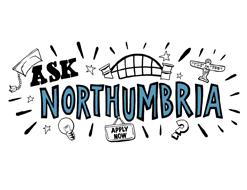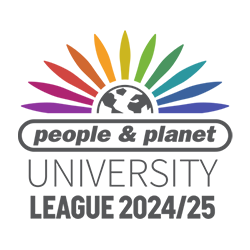-
Study
-
Undergraduate
- Search for a Course
- Undergraduate Open Day & Events
- Application Guides
- Northumbria University UCAS Exhibitions
- Foundation Years
- Undergraduate Fees & Funding
- School & College Outreach
- Continuing Professional Development
-
Postgraduate
- Postgraduate Study Degree
- Postgraduate Research Degrees
- Postgraduate Open Days and Events
- Postgraduate Fees & Funding
- Flexible Learning
- Thinking about a Masters?
- Continuing Professional Development
- Change Direction
-
Student Life
- The Hub - Student Blog
- Accommodation
- Life in Newcastle
- Support for Students
- Careers
- Information for Parents
- Students' Union
- Northumbria Sport
- Be Part of It
-
-
International
International
Northumbria’s global footprint touches every continent across the world, through our global partnerships across 17 institutions in 10 countries, to our 277,000 strong alumni community and 150 recruitment partners – we prepare our students for the challenges of tomorrow. Discover more about how to join Northumbria’s global family or our partnerships.
View our Global Footprint-
Applying to Northumbria
- European Union
- Our London Campus
- Northumbria Pathway
- International Events
- Entry Requirement and Education Country Agents
- Global Offices
-
Northumbria Language Centre
- Faculty Requirements
- Acceptable English Requirements
- Pre-sessional English Language and Study Skills
- Academic Language Skills Programmes (ALS)
-
International Fees, Funding & Scholarships
- International Undergraduate Fees
- International Undergraduate Funding
- International Masters Fees
- International Masters Funding
- International Postgraduate Research Fees
- International Postgraduate Research Funding
- International Money Matters
-
Life at Northumbria
- International student support
- Careers
-
International Mobility
- Current Northumbria Students
- Incoming Exchange Students
-
-
Business
Business
The world is changing faster than ever before. The future is there to be won by organisations who find ways to turn today's possibilities into tomorrows competitive edge. In a connected world, collaboration can be the key to success.
More on our Business Services -
Research
Research
Northumbria is a research-rich, business-focused, professional university with a global reputation for academic quality. We conduct ground-breaking research that is responsive to the science & technology, health & well being, economic and social and arts & cultural needs for the communities
Discover more about our Research -
About Us
-
About Northumbria
- Our Strategy
- Our Staff
- Place and Partnerships
- Student Profiles
- Alumni Profiles
- Leadership & Governance
- Academic Departments
- University Services
- History of Northumbria
- Contact us
- Online Shop
-
-
Alumni
Alumni
Northumbria University is renowned for the calibre of its business-ready graduates. Our alumni network has over 246,000 graduates based in 178 countries worldwide in a range of sectors, our alumni are making a real impact on the world.
Our Alumni - Work For Us
What will I learn on this module?
You will learn how to use the key forms, approaches and techniques of fantasy and science fiction in your own writing. As you explore these genres by reading a range of classic and contemporary texts, you will develop a critical understanding of speculative fiction in theory and practice. You will answer questions such as:
• What is a fantasy or science fiction text?
• How can we read such texts productively?
• What writing strategies do they use?
• How can you produce exciting and original fantasy/science fiction writing yourself?
How will I learn on this module?
You will learn through two weekly 90-minute seminars, individual tutorials, and independent learning. The seminars will introduce you to a wide range of fantasy and science fiction texts and relevant critical materials, including ‘how-to’ texts on the writing of these genres. You will discuss and analyse these texts in order to develop your understanding, and carry out writing activities in order to produce your own work. Part of the sessions will be given over to writing workshops, in which you will read and discuss fellow students’ work-in-progress.
At Level 6 the main impetus of your work must come from you: independent writing and study will form the main learning activity, and you must conceive, plan and drive forward your own writing project for this module. It is your opportunity to design and carry out your own piece of creative writing, putting into practice the techniques you have acquired on the degree so far. Your independent learning will be focused on reading and on producing your own fantasy/science fiction writing. Tutorials will enable you to gain one-to-one tutor feedback and to talk to your tutor about the development of your work.
How will I be supported academically on this module?
Support will come from tutors through seminars and individual tutorials. We will help you engage with a range of literary, theoretical, critical and reflective texts and provide writing exercises to help you produce your own fantasy or science fiction writing. We will provide tutor feedback and enable you to receive peer feedback on your draft work, to help you make your writing as good as it can be.
Tutors will make module information, learning materials and details of assessment available on the University’s eLearning Portal. We will help you to understand what is required in assessments and how your work will be measured against the assessment criteria.
The module tutor will be available in seminars, as well as during office hours, to discuss any queries or concerns you have.
You will also have access to a Guidance Tutor to support you on academic matters and provides to links for support on other matters. You will be invited to meet your Guidance Tutor regularly to review your progress. The Guidance Booklet, which you receive at the start of your first year, includes structured materials designed to help you develop your self-reflection skills. These materials underpin the academic side of the regular Guidance meetings, helping you to learn how to best use the feedback you receive on your assignments, how to build on your strengths, and improve in the areas where you could perform better.
What will I be expected to read on this module?
All modules at Northumbria include a range of reading materials that students are expected to engage with. Online reading lists (provided after enrolment) give you access to your reading material for your modules. The Library works in partnership with your module tutors to ensure you have access to the material that you need.
What will I be expected to achieve?
Knowledge & Understanding:
1. Knowledge of the forms, conventions, contexts and techniques of fantasy and/or science fiction literature
Intellectual / Professional skills & abilities:
2. ability to apply imagination and appropriate writing techniques to produce an effective piece of imaginative writing
3. ability to analyse and reflect on your own work and the work of others
4. ability to position creative work in relation to the norms and conventions of literary genres
Personal Values Attributes (Global / Cultural awareness, Ethics, Curiosity) (PVA):
5. development of a critical and imaginative attitude to the world
How will I be assessed?
Formative
Peer and tutor feedback will be provided on work-in-progress in seminar sessions.
A 1,500-word draft and plan will be submitted for tutor feedback
Summative
A portfolio made up of:
• 3,500 words prose fiction drawing on the fantasy and/or science fiction genres (MLO 1, 2, 5)
• with a 500-word critical commentary positioning the work in relation to other texts (MLO 3, 4)
A single mark is given, based on the literary merit of the creative component, and on the extent to which it applies ideas learned in the module, as evidenced by the commentary.
Pre-requisite(s)
N/A
Co-requisite(s)
N/A
Module abstract
On this module you will explore techniques for writing in the two popular genres of fantasy and science fiction. You will apply these techniques to your own creative writing in order to produce exciting, imaginative, unreal prose fiction. You will also read and analyse a wide range of novels and other texts, some of which may challenge your sense of what speculative literature is and does, as well as considering some theoretical account of the fantastic and the speculative. You will submit a piece of original fantasy and/or science fiction prose, accompanied by a critical commentary which reflects on the creative process and positions your work in relation to other texts in the genre. Sessions will be a mixture of taught sessions on particular topics and texts, and writing workshops where we discuss each other’s work-in-progress.
Course info
UCAS Code QW38
Credits 20
Level of Study Undergraduate
Mode of Study 3 years Full Time or 4 years with a placement (sandwich)/study abroad
Department Humanities
Location City Campus, Northumbria University
City Newcastle
Start September 2025
All information is accurate at the time of sharing.
Full time Courses are primarily delivered via on-campus face to face learning but could include elements of online learning. Most courses run as planned and as promoted on our website and via our marketing materials, but if there are any substantial changes (as determined by the Competition and Markets Authority) to a course or there is the potential that course may be withdrawn, we will notify all affected applicants as soon as possible with advice and guidance regarding their options. It is also important to be aware that optional modules listed on course pages may be subject to change depending on uptake numbers each year.
Contact time is subject to increase or decrease in line with possible restrictions imposed by the government or the University in the interest of maintaining the health and safety and wellbeing of students, staff, and visitors if this is deemed necessary in future.
Useful Links
Find out about our distinctive approach at
www.northumbria.ac.uk/exp
Admissions Terms and Conditions
northumbria.ac.uk/terms
Fees and Funding
northumbria.ac.uk/fees
Admissions Policy
northumbria.ac.uk/adpolicy
Admissions Complaints Policy
northumbria.ac.uk/complaints
















